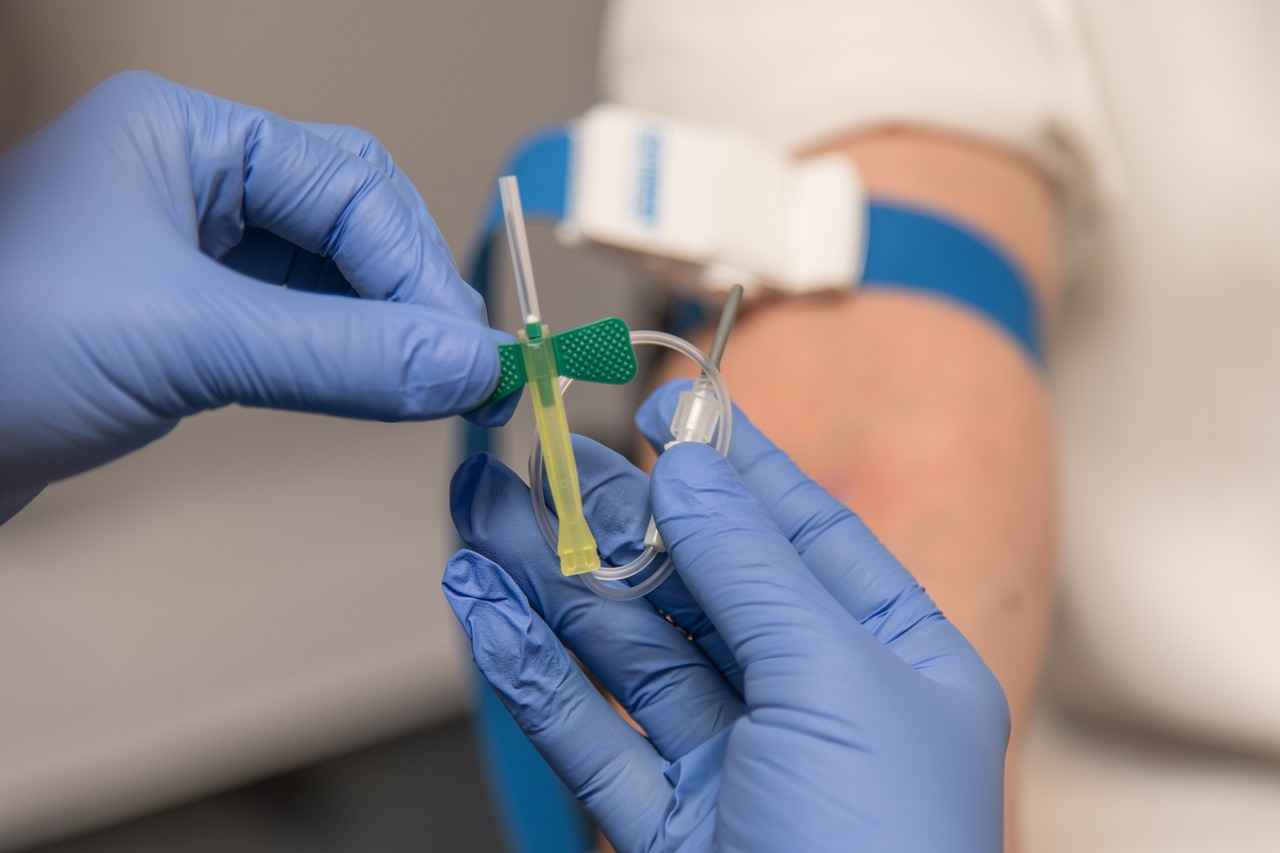This article delves into the guidelines and implications of drinking water while fasting for blood work, addressing common questions and providing expert insights to ensure clarity and understanding.
Understanding Fasting for Blood Work
Fasting for blood work is a standard procedure required for various medical tests. It typically involves abstaining from food and sometimes liquids for a specified period before the test. However, the specifics can differ based on the type of test being performed.
Why Is Fasting Necessary for Blood Tests?
Fasting is essential for certain blood tests as it ensures accurate results. It helps eliminate variables that could skew the findings, particularly for tests measuring glucose and lipid levels. Without fasting, the results may not accurately reflect a person’s baseline health status.
Common Blood Tests Requiring Fasting
- Lipid Panels: These tests measure cholesterol levels and require fasting to ensure that triglyceride levels are not influenced by recent food intake.
- Glucose Tests: Fasting glucose tests assess blood sugar levels, which is crucial for diagnosing conditions like diabetes.
Tests That Do Not Require Fasting
Not all blood tests necessitate fasting. For example, a complete blood count (CBC) can be performed without fasting, providing patients with greater flexibility regarding food and drink intake.
Can You Drink Water While Fasting for Blood Work?
Generally, drinking water while fasting for blood work is permitted and often encouraged. Hydration can facilitate blood draws and does not interfere with most test results. In fact, staying hydrated can make the blood draw process smoother.
Benefits of Staying Hydrated
Proper hydration before a blood test can help expand veins, making them easier to locate during the blood draw. This can lead to a more efficient and less uncomfortable experience.
Potential Risks of Drinking Other Beverages
While water is safe, consuming other beverages such as coffee, tea, or juice can impact test results. It’s crucial to stick to plain water to avoid any complications that could arise from these drinks.
How Much Water Can You Drink?
Moderation is key when drinking water before a blood test. Typically, small sips are sufficient to stay hydrated without risking any adverse effects on the test results. Overconsumption of water is not recommended, as it could lead to dilution of blood components.
What to Avoid While Fasting
In addition to avoiding food, certain substances should also be avoided during fasting. These include:
- Alcohol: Can significantly alter blood test outcomes.
- Sugary Drinks: Can lead to inaccurate results, especially for glucose tests.
Consulting Your Healthcare Provider
Always consult with your healthcare provider regarding fasting protocols for blood work. They can provide personalized advice based on your medical history and the specific tests being performed. This ensures that you are fully prepared for your blood work.
Conclusion: Preparing for Your Blood Test
Proper preparation, including understanding fasting requirements and hydration guidelines, is essential for ensuring accurate blood test results. By following these guidelines, you can contribute to effective healthcare management and enhance the overall experience of your medical tests.

Understanding Fasting for Blood Work
is a vital aspect of preparing for various medical tests. Many healthcare providers require patients to abstain from food and sometimes liquids prior to blood work to ensure the accuracy of the results. This practice is essential for certain tests, as the presence of food or drink can interfere with the measurements being taken.
Fasting typically means not eating or drinking anything except for water for a specific period, which can range from 8 to 12 hours, depending on the test. It is crucial to follow the fasting guidelines provided by your healthcare professional to avoid any potential inaccuracies in the test results.
Fasting is necessary for certain blood tests to eliminate variables that could skew the findings. For instance, tests measuring glucose and lipid levels require fasting to provide a clear picture of a patient’s metabolic state. When food is consumed, it can lead to temporary spikes in blood sugar or lipid levels, which may misrepresent a patient’s health status.
Several blood tests necessitate fasting to ensure accurate results. The most common tests include:
- Lipid Panel: This test measures cholesterol and triglyceride levels in the blood. Fasting helps ensure that triglyceride levels are not influenced by recent food intake.
- Fasting Glucose Test: This test evaluates blood sugar levels and is crucial for diagnosing diabetes. Fasting provides a baseline measurement of how well the body manages glucose.
Not all blood tests require fasting. For example, a Complete Blood Count (CBC) can be performed without any fasting, allowing patients more flexibility regarding their food and drink intake.
Yes, drinking water while fasting for blood work is generally permitted and often encouraged. Staying hydrated can facilitate blood draws, making the veins easier to locate. Moreover, hydration does not interfere with most test results, making it a safe option.
Proper hydration before a blood test can significantly improve the process. Well-hydrated patients often find that blood draws are smoother, as adequate fluid intake can help expand veins. This can make it easier for healthcare professionals to access the veins and draw blood with minimal discomfort.
While water is safe, consuming other beverages, such as coffee or juice, can impact test results. These drinks may contain sugars, caffeine, or other substances that could alter blood chemistry. Therefore, it’s essential to stick to plain water and avoid any other drinks during the fasting period.
Moderation is key when drinking water before a blood test. Generally, small sips are sufficient to stay hydrated without risking any adverse effects on the test results. Overconsumption of water is typically not an issue, but it’s always best to follow any specific instructions provided by your healthcare provider.
In addition to avoiding food, certain substances should be avoided during fasting, including:
- Alcohol: Consumption of alcohol can significantly alter test results and should be avoided.
- Sugary Drinks: These can lead to fluctuations in blood sugar levels, which can misrepresent your health status.
Always consult with your healthcare provider regarding fasting protocols for blood work. They can provide personalized advice based on your medical history and the specific tests being performed. This ensures that you are adequately prepared and that your results will be as accurate as possible.
In conclusion, understanding the requirements and guidelines for fasting before blood work is essential for obtaining reliable test results. By adhering to these protocols and staying hydrated with water, patients can contribute to effective healthcare management.

Why Is Fasting Necessary for Blood Tests?
Fasting is a critical component of many blood tests, ensuring that the results are both accurate and reliable. By abstaining from food and certain beverages, patients can help eliminate variables that might skew the findings, particularly for tests that measure glucose and lipid levels. Understanding the importance of fasting can help individuals prepare effectively and understand the rationale behind this practice.
When a healthcare provider orders blood tests, they often specify whether fasting is required. This requirement stems from the need to achieve a baseline measurement of various components in the blood. Food and drink can significantly influence these measurements, leading to potentially misleading results. For instance, consuming food can elevate blood sugar levels, while fats from meals can temporarily increase lipid levels, thus complicating the interpretation of the results.
Fasting allows for a more accurate assessment of the body’s metabolic state. For example, in a glucose test, fasting is essential to determine how well the body processes sugar without the influence of recent food intake. Similarly, a lipid panel requires fasting to accurately measure cholesterol and triglyceride levels, which can fluctuate based on recent dietary choices.
- Lipid Panel: Measures cholesterol levels and requires fasting to ensure accuracy.
- Fasting Glucose Test: Assesses blood sugar levels, crucial for diabetes diagnosis.
- Basic Metabolic Panel (BMP): Evaluates glucose, calcium, and electrolytes, necessitating fasting.
While many blood tests require fasting, others do not. For instance, a Complete Blood Count (CBC) can be performed without fasting. This flexibility allows patients to undergo necessary tests without the added burden of fasting, making the process more convenient.
Fasting before blood tests is not merely a formality; it plays a vital role in obtaining accurate health data. Healthcare providers rely on these results to make informed decisions about diagnosis and treatment. Therefore, adhering to fasting guidelines is crucial for effective healthcare management.
It’s important for patients to consult with their healthcare providers regarding fasting protocols. Each individual’s health history and the specific tests being conducted may warrant different fasting requirements. Personalized advice ensures that patients are well-informed and prepared, minimizing anxiety and uncertainty.
In summary, fasting is essential for many blood tests to ensure the accuracy of results. By understanding the reasons behind fasting requirements and consulting with healthcare providers, patients can better prepare for their blood work. This preparation not only enhances the reliability of test outcomes but also contributes to overall health management.
Common Blood Tests Requiring Fasting
Fasting is a critical component for certain blood tests, as it helps ensure the accuracy of results. Understanding which tests require fasting can greatly assist patients in preparing for their appointments, minimizing the risk of delays or inaccurate readings. Below are some of the most common blood tests that necessitate fasting:
- Lipid Panel: This test evaluates cholesterol levels in the blood, including total cholesterol, HDL (high-density lipoprotein), LDL (low-density lipoprotein), and triglycerides. Fasting for at least 9-12 hours prior to the test is typically recommended to ensure that triglyceride levels are not influenced by recent food intake. This is particularly important as elevated triglycerides can indicate a higher risk of heart disease.
- Fasting Glucose Test: This test measures blood sugar levels after a period of fasting. It is essential for diagnosing diabetes or prediabetes. Patients are usually required to fast for at least 8 hours before the test to provide a clear picture of how their body manages glucose levels without the influence of recent meals.
- Comprehensive Metabolic Panel (CMP): This test assesses various substances in the blood, including glucose, electrolytes, and proteins. Fasting is often required for accurate glucose and electrolyte readings, as food intake can alter these levels significantly.
- Basic Metabolic Panel (BMP): Similar to the CMP, the BMP evaluates glucose, calcium, and electrolytes. Fasting is typically required to ensure that these readings are not skewed by recent dietary intake.
- Iron Studies: Tests that measure iron levels, including serum iron, ferritin, and total iron-binding capacity, may also require fasting. This is to avoid fluctuations in iron levels that can occur after eating.
It is important to note that the specific fasting duration may vary based on the healthcare provider’s recommendations and the laboratory protocols. Patients should always confirm the exact requirements with their healthcare provider before the test.
Why is Fasting Important for These Tests?
Fasting is essential for these blood tests because it eliminates variables that can interfere with the results. For instance, recent food intake can lead to temporary spikes in glucose or triglyceride levels, which may mislead healthcare providers in diagnosing conditions such as diabetes or cardiovascular diseases. By fasting, patients help ensure the results reflect their baseline health status.
What to Expect During the Testing Process
When you arrive for your blood test, the healthcare provider will typically ask you about your fasting status. After confirming that you have adhered to the fasting requirements, a healthcare professional will draw blood, usually from a vein in your arm. The process is quick and generally involves minimal discomfort. After the blood is drawn, you may be advised to eat or drink something to replenish your energy.
Consulting Your Healthcare Provider
It is always wise to consult with your healthcare provider regarding fasting protocols for blood tests. They can provide tailored advice based on your medical history and the specific tests being performed. If you have any concerns or questions about fasting, don’t hesitate to ask for clarification.
Understanding the importance of fasting and the specific tests that require it can empower patients to take an active role in their healthcare. By preparing appropriately, individuals can contribute to more accurate diagnoses and effective treatment plans.
Lipid Panel
The is a crucial blood test that provides valuable insights into an individual’s cholesterol levels and overall heart health. It is commonly used to assess the risk of cardiovascular diseases and to guide treatment decisions. Understanding the importance of this test and the necessity of fasting can help patients prepare effectively and ensure accurate results.
A lipid panel typically measures several components, including:
- Total cholesterol: This is the overall amount of cholesterol in the blood.
- Low-density lipoprotein (LDL): Often referred to as ‘bad’ cholesterol, high levels of LDL can lead to plaque buildup in arteries.
- High-density lipoprotein (HDL): Known as ‘good’ cholesterol, HDL helps remove other forms of cholesterol from the bloodstream.
- Triglycerides: These are a type of fat found in the blood, and elevated levels can indicate a higher risk of heart disease.
Fasting before a lipid panel is essential to ensure that the triglyceride levels are accurate and not influenced by recent food intake. When a person eats, especially foods high in fats, it can temporarily elevate triglyceride levels, leading to misleading results. The typical fasting period is between 9 to 12 hours prior to the test, during which only water is usually permitted.
During this fasting period, it is important to stay hydrated. Drinking water can help facilitate blood draws by making veins more prominent and easier to locate. However, it is crucial to avoid any beverages that contain sugars or caffeine, as these can interfere with the test results.
Many patients may wonder how fasting impacts the lipid panel results. Research indicates that fasting is particularly important for triglyceride measurements. Non-fasting tests may show artificially low triglyceride levels, which could lead to a misinterpretation of a patient’s cardiovascular risk. Therefore, adhering to fasting guidelines is not just a formality; it is a critical step in obtaining accurate and reliable results.
While fasting is necessary for lipid panels, some healthcare providers may recommend non-fasting tests for certain individuals, particularly those who have a history of high cholesterol or cardiovascular issues. In these cases, the physician will consider the patient’s overall health and the specific circumstances surrounding their care.
In summary, the lipid panel is an important test for assessing cholesterol levels and cardiovascular health. Fasting before the test is essential to ensure the accuracy of triglyceride measurements and overall cholesterol levels. Staying hydrated with water during this period can aid in the blood draw process, while avoiding other beverages will help maintain the integrity of the test results. Always consult with your healthcare provider for personalized advice regarding fasting and lipid panels to ensure the best outcomes for your health.
Glucose Test
The is a vital diagnostic tool used to assess how well the body manages sugar levels. This test is particularly important in the context of diagnosing conditions such as diabetes and prediabetes. Understanding the nuances of the glucose test can empower patients to take charge of their health.
The fasting glucose test specifically measures the level of glucose in the blood after a period of fasting, typically for at least 8 hours. This fasting period is crucial as it provides a clear picture of how the body regulates blood sugar levels without the influence of recent food intake.
Fasting is essential for the glucose test because it eliminates variables that could skew results. When you eat, your blood sugar levels naturally rise. By fasting, healthcare providers can better assess how your body processes glucose, leading to more accurate diagnoses.
Normal fasting blood sugar levels typically range from 70 to 99 mg/dL. Levels between 100 to 125 mg/dL may indicate prediabetes, while levels of 126 mg/dL or higher on two separate tests suggest diabetes. These thresholds are critical for understanding your metabolic health.
- Follow Fasting Guidelines: Ensure you fast for at least 8 hours before the test.
- Avoid Certain Medications: Consult your doctor about any medications that may affect the test.
- Stay Hydrated: Drinking water is generally permitted and can aid in the blood draw process.
During the glucose test, a healthcare professional will draw blood from a vein, typically in your arm. The procedure is quick and usually involves minimal discomfort. After the blood is drawn, it will be sent to a laboratory for analysis.
Once the lab results are available, your healthcare provider will discuss them with you. If your fasting glucose levels are elevated, further testing may be recommended to confirm a diagnosis and evaluate your overall health.
If your results indicate high blood sugar levels, your doctor may suggest lifestyle changes, such as dietary adjustments and increased physical activity, or they may prescribe medications to help manage your condition. Regular monitoring and follow-up tests will also be essential in managing your health.
Understanding the fasting glucose test and its significance is crucial for early detection and management of diabetes. By adhering to fasting guidelines and preparing adequately, patients can ensure accurate results and take proactive steps toward better health.
Tests That Do Not Require Fasting
When it comes to blood tests, many individuals are often concerned about the fasting requirements. However, it is important to note that not all blood tests require fasting. Understanding which tests can be conducted without fasting can significantly ease the anxiety surrounding blood work and allow for greater flexibility in daily routines.
Several blood tests can be performed without the need for fasting. This not only simplifies the process for patients but also helps in maintaining their regular eating habits. Here are some common tests that are typically not affected by food intake:
- Complete Blood Count (CBC): This test evaluates overall health and detects a variety of disorders, including anemia and infections. A CBC does not require fasting, making it convenient for patients.
- Thyroid Function Tests: These tests assess how well the thyroid is working and include measurements of hormones like TSH, T3, and T4. Fasting is not necessary, allowing patients to have their tests done at any time of day.
- Basic Metabolic Panel (BMP): While some components of the BMP can be influenced by recent food consumption, fasting is not strictly required for the overall assessment of kidney function, electrolytes, and blood sugar levels.
- Liver Function Tests: These tests measure the levels of enzymes and proteins in the blood to evaluate liver health. Fasting is not a prerequisite, allowing for more accessible scheduling.
- Vitamin B12 and Folate Levels: Testing for these vitamins can be done without fasting, making it easier for patients who may have irregular eating patterns.
These tests provide valuable insights into a patient’s health without the constraints of fasting, which can often be inconvenient or stressful. It is essential for patients to communicate with their healthcare providers regarding specific testing requirements.
The ability to conduct certain blood tests without fasting offers several advantages:
- Convenience: Patients can schedule their tests at any time, without worrying about when they last ate.
- Reduced Anxiety: Eliminating fasting requirements can lessen the stress associated with preparing for blood work.
- Better Compliance: Patients are more likely to follow through with testing when they are not burdened by fasting protocols.
While many tests do not require fasting, it is crucial for patients to consult with their healthcare providers. They can offer tailored advice based on individual health needs and the specific tests being ordered. This ensures that patients are adequately prepared and understand the implications of their test results.
In summary, understanding which blood tests do not require fasting can empower patients to manage their health more effectively. It is always advisable to seek clarification from healthcare professionals to navigate the complexities of blood testing with confidence.

Can You Drink Water While Fasting for Blood Work?
When preparing for blood work, many patients wonder about the rules surrounding fasting. One common question is whether it is permissible to drink water during this fasting period. The answer is generally affirmative; drinking water while fasting for blood work is not only allowed but often encouraged. Staying hydrated can significantly improve the blood draw process and ensure accurate test results.
Hydration plays a crucial role in the fasting process. When you drink water, it helps to expand your veins, making them easier for healthcare professionals to locate during the blood draw. This can lead to a smoother experience, reducing the chances of multiple needle sticks or complications during the procedure.
Drinking plain water does not interfere with most blood tests. In fact, it can help maintain your body’s overall physiological balance. However, it is important to avoid any beverages that contain calories, sugars, or caffeine, as these can alter your test results. For instance, drinks like coffee, tea, or juice can introduce variables that might skew the findings of tests such as glucose or lipid panels.
While staying hydrated is beneficial, moderation is key. It is advisable to sip water rather than consume large amounts at once. Typically, small sips of water are sufficient to keep you hydrated without risking any adverse effects on the tests being performed. Aim for around 8 to 12 ounces of water, but always listen to your body’s signals.
Many blood tests, such as lipid panels and fasting glucose tests, allow for water consumption. These tests require fasting to ensure accurate results, but the hydration from water does not compromise the integrity of the findings. In fact, it can enhance the efficiency of the blood draw.
Dehydration can lead to difficulties during blood draws, including collapsed veins or difficulty locating veins. This can result in a longer and more uncomfortable experience for the patient. Therefore, ensuring adequate hydration before your appointment is essential.
It is always wise to consult with your healthcare provider regarding specific fasting protocols for your blood work. They can offer tailored advice based on your medical history and the particular tests you are undergoing. This personalized guidance can help you understand what is permissible and what to avoid.
- Food: All solid foods should be avoided during the fasting period.
- Alcohol: Alcohol can significantly alter test results and should be strictly avoided.
- Caloric Beverages: Any drink containing calories, including sugary drinks or juices, should not be consumed.
In summary, drinking water while fasting for blood work is generally permitted and can be beneficial. Staying hydrated ensures a smoother blood draw experience and helps maintain the accuracy of test results. Always follow your healthcare provider’s instructions and make sure to clarify any doubts you may have regarding fasting protocols. Proper preparation can lead to effective healthcare management and peace of mind during your medical appointments.
Benefits of Staying Hydrated
Staying hydrated before a blood test is not just a recommendation; it is a vital part of preparing for the procedure. Many people often overlook the significance of hydration, but it can significantly impact the blood draw experience. In this section, we will delve into the before undergoing blood tests, highlighting why it is essential and how it can enhance the overall process.
- Improved Vein Visibility: One of the most notable advantages of proper hydration is that it helps to expand your veins. When you drink enough water, your blood volume increases, making veins more prominent and easier for the healthcare professional to locate during the blood draw.
- Reduced Discomfort: A well-hydrated body can lead to a smoother blood draw experience. Dehydration can make veins more difficult to access, potentially resulting in multiple attempts to draw blood, which can be uncomfortable and distressing for patients.
- Enhanced Blood Flow: Hydration plays a crucial role in maintaining optimal blood circulation. When your body is adequately hydrated, your blood flows more freely, which can facilitate a quicker and more efficient blood draw.
- Minimized Risk of Complications: Staying hydrated can also help reduce the risk of complications such as fainting or feeling lightheaded during the blood draw. Proper hydration supports overall bodily functions and can help you feel more stable during the procedure.
- Accurate Test Results: While drinking water does not interfere with most blood tests, being well-hydrated can ensure that the blood sample is taken under optimal conditions. This can lead to more accurate results, particularly for tests that may be sensitive to blood volume changes.
It is essential to remember that while hydration is beneficial, moderation is key. Drinking excessive amounts of water right before a blood test can lead to discomfort and may even complicate the blood draw process. Therefore, aim for adequate hydration in the hours leading up to your appointment, rather than trying to drink large quantities all at once.
In summary, staying hydrated before your blood test can have a multitude of benefits. From making veins more accessible to enhancing overall comfort and accuracy of test results, proper hydration is a simple yet effective way to prepare for your appointment. Always consult with your healthcare provider for personalized advice regarding hydration and fasting protocols specific to your blood tests.
Potential Risks of Drinking Other Beverages
When preparing for blood tests, understanding the implications of what you consume during the fasting period is vital. While water is generally considered safe and is often encouraged, the same cannot be said for other beverages. This section delves into the while fasting for blood work and why it is crucial to adhere to guidelines.
Many individuals may wonder if consuming beverages like coffee, tea, or fruit juices during fasting is permissible. The answer is a resounding no. These drinks can significantly alter the results of various blood tests due to their chemical compositions. For instance, coffee contains caffeine, which can affect metabolism and insulin sensitivity, potentially skewing glucose levels. Similarly, fruit juices contain sugars that can lead to elevated blood sugar readings, complicating the interpretation of results.
Water is the only beverage recommended during fasting for blood work because it is calorie-free and does not introduce any substances that could interfere with test outcomes. Staying hydrated with plain water helps maintain blood volume, making the blood draw smoother and less uncomfortable. Furthermore, proper hydration can help expand veins, making them easier to locate for healthcare professionals.
| Test Type | Effect of Other Beverages |
|---|---|
| Glucose Tests | Fruit juices can spike blood sugar levels, leading to inaccurate diabetes assessments. |
| Lipid Panels | Caffeine from coffee can alter lipid metabolism, affecting cholesterol readings. |
| Metabolic Panels | Any caloric intake, including from beverages, can compromise electrolyte balance. |
Drinking beverages other than water can lead to several complications:
- Inaccurate Test Results: Consuming anything other than water can introduce variables that lead to misleading results.
- Increased Anxiety: Uncertainty about the effects of other beverages can cause stress, affecting overall health.
- Delayed Testing: If test results are deemed unreliable, it may necessitate a repeat of the blood work, leading to delays in diagnosis and treatment.
Healthcare providers consistently advise sticking to water during fasting periods. It is essential to communicate with your healthcare provider about any questions or concerns regarding fasting protocols. They can offer personalized recommendations based on your medical history and the specific tests being conducted.
In summary, while the temptation to consume other beverages may be strong, the risks associated with doing so far outweigh any potential benefits. Adhering to the guideline of drinking only water during fasting for blood work is crucial for obtaining accurate and reliable test results.

How Much Water Can You Drink?
When preparing for blood work, understanding the guidelines surrounding hydration is essential. One common question patients have is, “How much water can you drink while fasting for blood tests?” The answer is crucial for ensuring accurate test results and a smooth experience during the blood draw.
Moderation is key when drinking water before a blood test. Generally, small sips are sufficient to stay hydrated without risking any adverse effects on the test results. While it’s important to remain hydrated, excessive water intake shortly before a blood test could potentially dilute the blood sample, leading to inaccurate readings.
Staying hydrated before your blood test is beneficial for several reasons:
- Easier Blood Draw: Proper hydration helps expand your veins, making them easier to locate and reducing the discomfort associated with blood draws.
- Improved Accuracy: Adequate hydration can help ensure that the blood sample taken is representative of your actual blood composition, thus improving the accuracy of the test results.
- Reduced Risk of Complications: Being well-hydrated can decrease the likelihood of complications such as fainting or feeling lightheaded during or after the blood draw.
While it’s generally safe to drink water before a blood test, here are some guidelines to follow:
- Small Sips: Take small sips of water rather than drinking large amounts all at once. This approach helps maintain hydration without overwhelming your system.
- Avoid Other Beverages: Stick to plain water. Consuming coffee, tea, or sugary drinks can interfere with test results and should be avoided.
- Timing Matters: If you’re unsure, consider limiting your water intake to a few hours before the test. This will help ensure that your blood sample is not diluted.
Every individual’s health situation is unique, and some tests may have specific requirements regarding hydration. Always consult your healthcare provider about the appropriate amount of water to drink before your blood test. They can provide tailored advice based on your medical history and the specific tests you are undergoing.
There are several myths surrounding hydration and fasting for blood tests. One common misconception is that fasting means complete abstinence from all liquids. In fact, most healthcare professionals agree that drinking water is permissible and beneficial. However, it’s essential to avoid any drinks that contain calories, sugar, or caffeine, as these can lead to skewed results.
In summary, when preparing for a blood test, drinking small amounts of water is typically recommended. It’s crucial to maintain hydration to facilitate a smooth blood draw while being mindful of not overdoing it. Always check with your healthcare provider for specific instructions regarding your tests to ensure the most accurate results.

What to Avoid While Fasting
When preparing for blood tests, it is essential to understand what to avoid during fasting to ensure accurate results. Fasting typically requires abstaining from food and certain beverages. However, the specifics can vary depending on the test being conducted. This section will delve into the substances that should be avoided while fasting, emphasizing their potential impact on blood test outcomes.
Fasting is a critical component of many blood tests, as it helps eliminate variables that could skew results. This practice is particularly important for tests measuring glucose and lipid levels. Understanding what to avoid during fasting is crucial for obtaining reliable results.
In addition to food, there are several substances that individuals should refrain from consuming while fasting:
- Alcohol: Consuming alcohol can significantly alter blood test results. It can affect liver function tests and lead to inaccurate readings for glucose and triglycerides. Therefore, it is advisable to avoid any alcoholic beverages during the fasting period.
- Sugary Drinks: Beverages high in sugar, such as sodas and fruit juices, can spike blood sugar levels and interfere with tests designed to measure glucose levels. Even small amounts can distort results, making it essential to stick to plain water.
- Caffeinated Beverages: While some studies suggest that black coffee may not significantly affect certain tests, it is generally recommended to avoid caffeine altogether during fasting. Caffeine can influence blood pressure and heart rate, potentially impacting test outcomes.
- High-Calorie Beverages: Smoothies, protein shakes, and other high-calorie drinks should also be avoided, as they can provide your body with calories and nutrients that can skew test results.
- Herbal Teas: Although some herbal teas may not contain calories, they can still affect blood chemistry. It’s best to consult with your healthcare provider regarding the consumption of herbal teas during fasting.
While it is crucial to avoid certain substances, staying hydrated with plain water is encouraged. Adequate hydration can facilitate blood draws by making veins more prominent and easier to locate. However, moderation is key; small sips of water are generally sufficient to maintain hydration without compromising test accuracy.
Before undergoing any blood tests, it is always wise to consult with your healthcare provider. They can provide tailored advice based on your medical history and the specific tests being performed. This ensures that you are fully informed about what to avoid during fasting.
Understanding what to avoid while fasting for blood work is essential for ensuring accurate test results. By refraining from alcohol, sugary drinks, and other specific substances, individuals can help maintain the integrity of their blood tests. Always prioritize hydration with plain water and consult with a healthcare provider for personalized guidance.

Consulting Your Healthcare Provider
When it comes to preparing for blood work, is essential. They can offer tailored advice that takes into account your unique medical history and the specific tests you will undergo. This personalized approach is crucial for ensuring that you achieve the most accurate results possible.
Many patients may not realize that different blood tests have varying requirements regarding fasting and hydration. For instance, while some tests may necessitate a complete fast, others might allow for certain beverages. Your healthcare provider will clarify these requirements, helping you navigate the fasting process with confidence.
In addition to fasting protocols, your healthcare provider can also inform you about any medications you may be taking that could affect test results. Some medications may need to be paused or adjusted before testing, and only your provider can give you the right guidance in this regard.
Another important aspect to consider is your overall health condition. If you have pre-existing health issues, such as diabetes or cardiovascular problems, your provider can recommend fasting protocols that are safe and effective for you. This is particularly important for tests like glucose or lipid panels, where fasting can significantly influence the results.
Moreover, your healthcare provider can help you understand the purpose of each test. Knowing why a particular test is being conducted can alleviate anxiety and help you feel more prepared. For example, if you’re having a lipid panel done, understanding that it measures cholesterol levels can motivate you to adhere strictly to fasting guidelines.
Furthermore, it’s important to discuss any concerns or questions you may have about the testing process. Whether it’s about the duration of the fast, what to expect during the blood draw, or how to manage any discomfort, your healthcare provider is there to address these issues. Open communication can significantly enhance your experience and reduce any stress associated with the process.
In addition to verbal consultations, many healthcare providers offer written guidelines or resources that outline fasting protocols and other preparatory measures. These resources can serve as a handy reference, ensuring you are well-prepared for your blood work.
Overall, the relationship you have with your healthcare provider is instrumental in ensuring that you are well-informed and prepared for blood tests. By seeking their advice, you not only enhance your understanding of the process but also take an active role in your healthcare journey.
In summary, always prioritize consulting with your healthcare provider regarding fasting protocols for blood work. Their expertise and personalized guidance can make a significant difference in the accuracy of your test results and your overall health management.

Conclusion: Preparing for Your Blood Test
Proper preparation for blood tests is essential for obtaining accurate results and ensuring effective healthcare management. Understanding the fasting requirements and hydration guidelines can significantly impact the outcomes of various blood tests. This article delves into the importance of these aspects, providing insights to help you navigate your upcoming blood work.
Fasting before a blood test typically involves abstaining from food and sometimes liquids for a specified period. The duration and specifics of fasting can vary depending on the type of test being performed. For instance, tests that measure glucose and lipid levels often require a longer fasting period compared to others. Knowing which tests require fasting can help you prepare adequately, minimizing the risk of delayed results.
In many cases, healthcare providers recommend drinking water while fasting. Staying hydrated is not only permissible but also beneficial as it can make the blood draw process easier. Hydration helps expand veins, making them more accessible for blood collection. Moreover, drinking water does not interfere with the majority of blood tests, allowing for accurate measurements of your health indicators.
However, it’s essential to avoid other beverages such as coffee, tea, or juice while fasting, as these can introduce variables that may skew test results. For example, caffeine can affect glucose levels, leading to potentially misleading outcomes. Therefore, sticking to plain water is crucial during the fasting period.
When it comes to the amount of water to consume, moderation is key. Sipping small amounts of water is generally sufficient to maintain hydration without risking any adverse effects on the test results. Overconsumption of water is not typically necessary and could lead to discomfort during the blood draw.
In addition to food and drink, certain substances should be avoided during fasting. Alcohol and sugary drinks are prime examples, as they can significantly alter blood test outcomes. Being mindful of these restrictions is vital for ensuring the integrity of your test results.
Consulting with your healthcare provider is always recommended when preparing for blood tests. They can offer personalized guidance based on your medical history, the specific tests you are undergoing, and any other relevant factors. This tailored advice can help clarify any uncertainties you may have about the fasting process.
In summary, proper preparation for blood tests encompasses a thorough understanding of fasting requirements and hydration guidelines. By following these protocols, you can ensure that your test results are accurate, paving the way for effective healthcare management. Remember, staying hydrated with water and avoiding other beverages can contribute significantly to this process. Always seek professional advice to tailor your preparation to your unique health needs.
Frequently Asked Questions
- Can I drink water while fasting for blood work?
Yes, drinking water is generally allowed and even encouraged while fasting for blood work. Staying hydrated can help make the blood draw easier and does not interfere with most test results.
- How much water can I drink before my blood test?
Moderation is key! Small sips of water are usually sufficient to keep you hydrated without affecting your test results. Just avoid excessive amounts.
- What should I avoid while fasting for blood work?
In addition to food, it’s important to avoid alcohol, sugary drinks, and other beverages like coffee or tea, as they can skew your test results.
- Are there any blood tests that do not require fasting?
Absolutely! Tests like complete blood counts (CBC) can be done without fasting, giving you a bit more flexibility with your food and drink.
- Why is fasting necessary for certain blood tests?
Fasting helps eliminate variables that could affect the accuracy of the results, especially for tests measuring glucose and lipid levels. It ensures that your body is in a baseline state.












